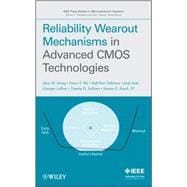
What is included with this book?
Alvin W. Strong, PhD, is retired from IBM in Essex Junction, Vermont. He holds nineteen patents, has authored or coauthored a number of papers, and is a member of the IEEE and chair of the JEDEC 14.2 standards subcommittee. ERNEST Y. WU, PhD, is a Senior Technical Staff Member at Semiconductor Research and Development Center (SRDC) in the IBM System and Technology Group. He has authored or coauthored more than 100 technical or conference papers. His research interests include dielectric/device reliability and electronic physics. ROLF-PETER VOLLERTSEN, PhD, is a Principal for Reliability Methodology at Infineon Technologies AG in Munich, Germany, where he is responsible for methods and test structures for fast Wafer Level Reliability monitoring and the implementation of fast WLR methods. JORDI SU??, PhD, is Professor of Electronics Engineering at the Universitat Aut?noma de Barcelona, Spain. He is Senior Member of the IEEE and has coauthored over 150 publications on oxide reliability and electron devices. His research interests are in gate oxide physics, reliability statistics, and modeling of nanometer-scale electron devices. GIUSEPPE LaROSA, PhD, is Project Leader of the FEOL technology reliability qualification activities for the development of advanced SOI Logic and eDRAM technologies at IBM, where he is responsible for the implementation and development of state-of-the-art NBTI stress and test methodologies. TIMOTHY D. SULLIVAN, PhD, is Team Leader for metallization reliability at IBM?s Essex Junction facility. The author of numerous technical papers and tutorials, he holds thirteen patents with several more pending. STEWART E. RAUCH, III, PhD, is currently a Senior Technical Staff Member at the IBM SRDC in New York, where he specializes in hot carrier and NBTI reliability of state-of-the-art CMOS devices. He is the author of numerous technical papers and tutorials and holds five patents.
| Preface | |
| Introduction | |
| Book Philosophy | |
| Lifetime and Acceleration Concepts | |
| Mechanism Types | |
| Reliability Statistics | |
| Chi-Square and Student t Distributions | |
| Application | |
| Dielectric Characterization And Reliability Methodology | |
| Introduction | |
| Fundamentals of Insulator Physics and Characterization | |
| Measurement of Dielectric Reliability | |
| Fundamentals of Dielectric Breakdown Statistics | |
| Summary and Future Trends | |
| Dielectric Breakdown Of Gate Oxides: Physics And Experiments | |
| Introduction | |
| Physics of Degradation and Breakdown | |
| Physical Models for Oxide Degradation and Breakdown | |
| Experimental Results of Oxide Breakdown | |
| Post-Breakdown Phenomena | |
| Negative Bias Temperature Instabilities In Pmosfet Devices | |
| Introduction | |
| Considerations on NBTI Stress Configurations | |
| Appropriate NBTI Stress Bias Dependence | |
| Nature of the NBTI Damage | |
| Impact of the NBTI Damage to Key pMOSFET Transistor Parameters | |
| Physical Mechanisms Contributing to the NBTI Damage | |
| Key Experimental Observations on the NBTI Damage | |
| Nit Generation by ReactionDiffusion (RD) Processes | |
| Hole Trapping Modeling | |
| NBTI Dependence on CMOS Processes | |
| NBTI Dependence on Area Scaling | |
| Overview of Key NBTI Features | |
| Hot Carriers | |
| Introduction | |
| Hot Carriers: Physical Generation and Injection Mechanisms | |
| Hot Carrier Damage Mechanisms | |
| HC Impact to MOSFET Characteristics | |
| Hot Carrier Shift Models | |
| Stress-Induced Voiding | |
| Introduction | |
| Theory and Model | |
| Role of the Overlying Dielectric | |
| Summary of Voiding in Al Metallizations | |
| Stress Voiding in Cu Interconnects | |
| Concluding Remarks | |
| Electromigration | |
| Introduction | |
| Metallization Failure | |
| Electromigration | |
| General Approach to Electromigration Reliability | |
| Thermal Considerations for Electromigration | |
| Closing Remarks | |
| Index | |
| Table of Contents provided by Publisher. All Rights Reserved. |
The New copy of this book will include any supplemental materials advertised. Please check the title of the book to determine if it should include any access cards, study guides, lab manuals, CDs, etc.
The Used, Rental and eBook copies of this book are not guaranteed to include any supplemental materials. Typically, only the book itself is included. This is true even if the title states it includes any access cards, study guides, lab manuals, CDs, etc.